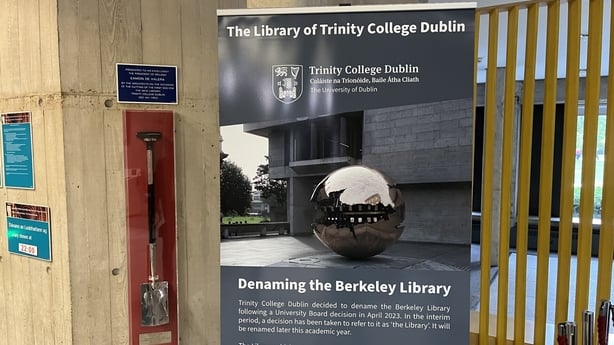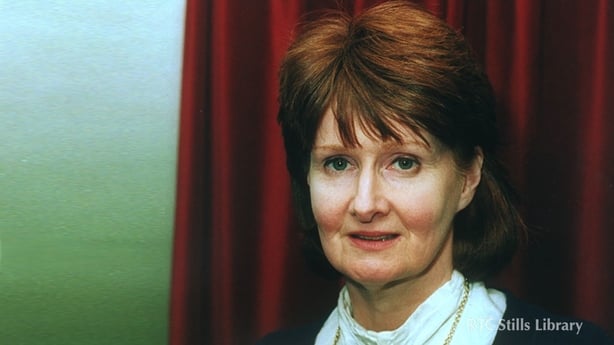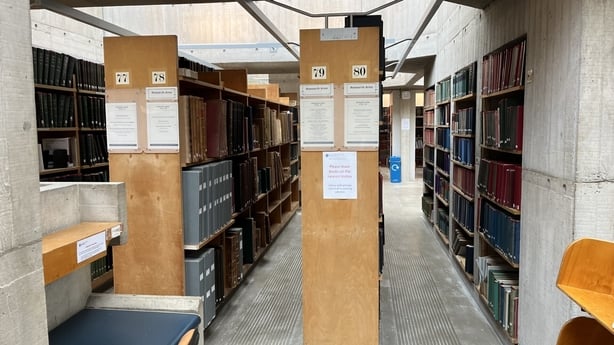The main library at Trinity College Dublin (TCD) has been renamed after Irish poet Eavan Boland.
It will be the first building on Trinity's campus to be named after a woman.
The decision was announced today following a meeting of the University Board.
The library, formerly known as the George Berkeley Library, was denamed in April 2023 because the renowned Irish philosopher was also a slave owner and what was described as "an apologist for slavery".
At the time, TCD said the use of Mr Berkeley’s name on its main library was inconsistent with the university's core values of human dignity, freedom, inclusivity and equality.

The move to name the building in honour of Eavan Boland follows a period of research, analysis and public consultation overseen by the Trinity Legacies Review Working Group (TLRWG).
During a public consultation, 855 submissions were made.
The working group identified several options for consideration, with the renaming of the building as the Eavan Boland Library their preferred recommendation to the board.
The poet, who died in 2020, was one of the foremost women in Irish literature, publishing many collections of poetry as well as teaching and lecturing in Ireland and in the US.

Born in Dublin in 1944, Eavan Boland spent some early years in London and New York, returning to Ireland to attend secondary school in Killiney and later university at Trinity.
As well as being a student, she was later a lecturer at the university.
The Provost of TCD said it is a "fitting recognition of Eavan Boland’s poetic genius that our main library, used by so many students and staff, will now carry her name".
Dr Linda Doyle said: "Eavan’s poetry is well-known across the generations, and her outstanding artistic contribution to highlighting the role of women in Irish society is widely appreciated.
"I want to sincerely thank everyone who participated in the process that has led us to today’s decision. It was marked by broad consultation and very thoughtful conversations."
Professor Eoin O'Sullivan, Senior Dean and Chair of the TLRWG, said the group arrived at this point because of "the hard work and conviction of many people in Trinity’s community, not least the students who not only called for a change in the Library’s name, but who worked with us to achieve that change".
"We are grateful for the 855 submissions from within Trinity and outside which animated our deliberations and reflections on the matter," he added.
TCD said it will continue to hold George Berkeley's philosophical works in the library collections and continue to teach and research his works.

An Emeritus Professor of History at the University of Galway said he believes the denaming of the library by trying to apply the ethical standards of the 21st century on the 18th century was undeserved.
Nicholas Canny said George Berkeley had been trying to improve the condition of slaves as his association with slavery was "as a critic of slavery".
He said the Irish philosopher was "critical of the way in which slaves were being treated, particularly under transatlantic voyage".
"He wanted to set up a college in Bermuda, which would be available to the sons of planters, hoping that by providing them with an enlightened education, modeled on that available in Trinity College Dublin, that they would be more humane in their treatment of their slaves.
"We can see that that is wishful thinking today," he added.
Professor Canny said it was not until towards the end of the 18th century and beginning of the 19th century that people began to see slavery as "an evil institution which should be abolished".
"Previous to then, it was accepted that slavery was part and parcel of a the social condition. It had existed in biblical times and therefore it appeared to be condoned by scriptures."
He said there had been very limited criticism of slavery at the time.
"Berkeley died, I think, in 1753 there had been very little public criticism of slavery, either on moral grounds or religious grounds, up to that point."
Mr Canny said one of his objections to the denaming was because "it appeared to be an effort to deny the extent to which Western society generally was an endorser of slavery for a long part of its existence".
"In the 18th century, all large institutions, states, churches, all had a vested interest in slavery.
"Because he was so mildly linked to slavery and because he was attempting to reform the institution of slavery, I thought that he was very undeserving of the apparent shame of having his name removed from the library," he added.
"On the other hand, if it was an individual who had been a notorious slave trader or something like that, their activity was quite iniquitous, so that in that sense, denaming of somebody of that nature, somebody who's heavily involved in slavery, might have some justification in trying to apply the ethical standards of the 21st century on the 18th century."







